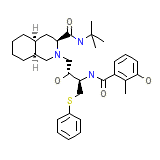1UN




Categoria
1UN Marchi, 1UN Analoghi
1UN Marchi miscela
1UN Formula chimica
C32H45N3O4S
1UN RX link
http://www.rxlist.com/cgi/generic2/nelfin.htm
1UN FDA foglio
1UN DMS (foglio di materiale di sicurezza)
1UN Sintesi di riferimento
Nessuna informazione disponibile
1UN Peso molecolare
567.784 g/mol
1UN Temperatura di fusione
349.84 oC
1UN H2O Solubilita
Leggermente solubile
1UN Stato
Solid
1UN LogP
5.247
1UN Forme di dosaggio
Tablet (per via orale - 250 mg, 625 mg), Polvere (orale)
1UN Indicazione
Usato in combinazione con altri farmaci antivirali nel trattamento dell'infezione da HIV in adulti e bambini.
1UN Farmacologia
Nelfinavir è un inibitore della proteasi con attività contro il virus dell'immunodeficienza umana di tipo 1 (HIV-1). Inibitori della proteasi blocco da parte di HIV proteasi chiamata. Proteasi dell'HIV-1 è un enzima necessario per la la segmentazione proteolitica dei precursori poliproteici virale nelle singole proteine funzionali si trovano in infettive da HIV-1. Nelfinavir si lega al sito attivo della proteasi e inibisce l'attività di l'enzima. Questa inibizione impedisce la segmentazione del poliproteine virale causando la formazione di particelle virali immature non infettive. Inibitori della proteasi sono quasi sempre utilizzati in combinazione con almeno altri due farmaci anti-HIV.
1UN Assorbimento
Ben assorbito dopo somministrazione orale.
1UN Tossicita
LD50 orale è finita 5g/kg nei ratti. Gli effetti collaterali includono sete e la fame, inspiegabile perdita di peso, aumento della minzione, affaticamento e pelle secca e prurito.
1UN Informazioni paziente
PATIENT INFORMATION
Patients should be informed that VIRACEPT is not a cure for HIV infection and that they may
continue to acquire illnesses associated with advanced HIV infection, including opportunistic
infections.
Patients should be told that the long-term effects of VIRACEPT are unknown at this time. They
should be told that there is currently no data demonstrating that VIRACEPT therapy can reduce
the risk of transmitting HIV to others through sexual contact or blood contamination.
Patients should be advised to take VIRACEPT every day as prescribed. Patients should not alter
the dose or discontinue therapy without consulting with their doctor. If a dose is missed, patients
should take the dose as soon as possible and then return to their normal schedule. However, if a dose
is skipped, the patient should not double the next dose.
The most frequent adverse event associated with VIRACEPT is diarrhea, which can usually be controlled
with non-prescription drugs, such as loperamide, which slow gastrointestinal motility.
VIRACEPT may interact with some drugs, therefore, patients should be advised to report to their doctor
the use of any other prescription or non-prescription medication.
Patients receiving oral contraceptives should be instructed that alternate or additional contraceptive
measures should be used during therapy with VIRACEPT.
Patients should be informed that VIRACEPT is not a cure for HIV infection and that they may
continue to acquire illnesses associated with advanced HIV infection, including opportunistic
infections.
Patients should be told that the long-term effects of VIRACEPT are unknown at this time. They
should be told that there is currently no data demonstrating that VIRACEPT therapy can reduce
the risk of transmitting HIV to others through sexual contact or blood contamination.
Patients should be advised to take VIRACEPT every day as prescribed. Patients should not alter
the dose or discontinue therapy without consulting with their doctor. If a dose is missed, patients
should take the dose as soon as possible and then return to their normal schedule. However, if a dose
is skipped, the patient should not double the next dose.
The most frequent adverse event associated with VIRACEPT is diarrhea, which can usually be controlled
with non-prescription drugs, such as loperamide, which slow gastrointestinal motility.
VIRACEPT may interact with some drugs, therefore, patients should be advised to report to their doctor
the use of any other prescription or non-prescription medication.
Patients receiving oral contraceptives should be instructed that alternate or additional contraceptive
measures should be used during therapy with VIRACEPT.
1UN Atto interessato organismi
Virus dell'immunodeficienza umana














